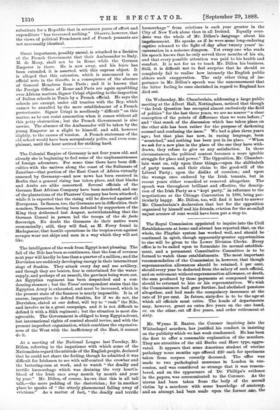At a meeting of the National League last Tuesday, Mr.
Dillon, referring to the impatience with which some of the Nationalists regard the attitude of the English people, declared that he could not share the feeling, though he admitted it was difficult for Irishmen to see with self-control the crowbar and the battering-ram at work, and to watch " the _deadly and terrific haemorrhage which was draining the very heart's- blood of the Irish race away month by month and year by year." Mr. Dillon, of course, knows that this is all tall talk,—the mere padding of the rhetorician ; for in another place he speaks of " the utterly phenomenal falling away of evictions." As a matter of fact, the deadly and terrific haemorrhage " from evictions is each year greater in the City of New York alone than in all Ireland. Equally over- done was the whole of Mr. Dillon's language about his imprisonment. He speaks as if he were some long-enduring captive released to the light of day after twenty years' in- carceration in a noisome dungeon. Yet every one who reads his speech knows that he only served three months of his six, and that every possible attention was paid to his health and comfort. It is not for us to teach Mr. Dillon his business. Still, it is difficult mot to feel surprise that he should so completely fail to realise how intensely the English public abhors such exaggeration. The only other thing of im- portance in Mr. Dillon's speech was the announcement that the bitter feeling he once cherished in regard.to England has died out.






































 Previous page
Previous page